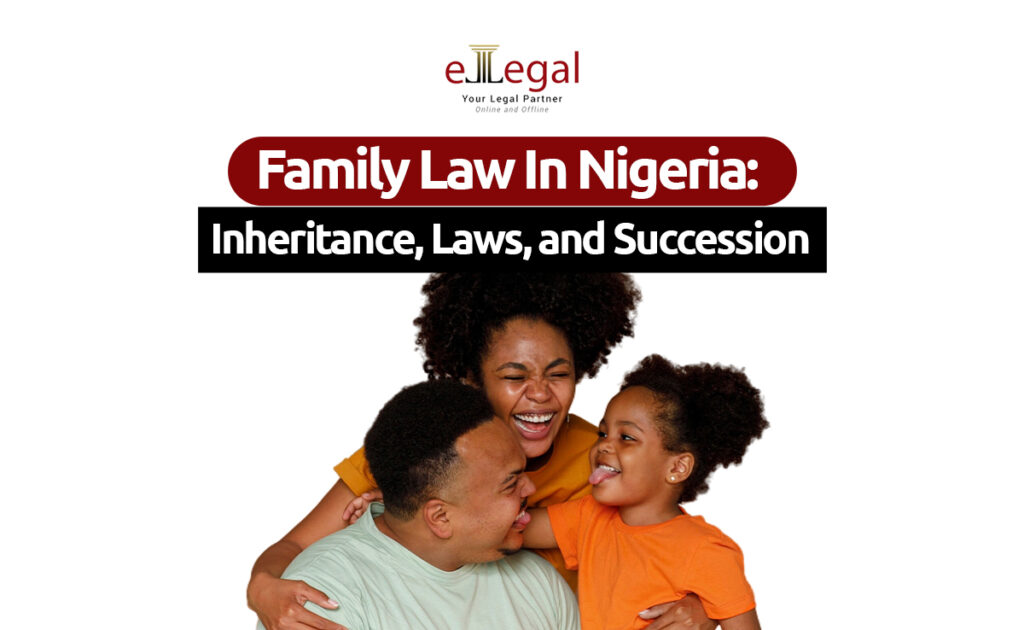The realm of family law in Nigeria is constantly evolving, influenced by a combination of traditional customs, religious doctrines, and statutes. The rules concerning inheritance and succession are of significant importance, and serve as fundamental pillars in determining the entitlements of members within Nigerian households.
This blog explores the complexities of family law in Nigeria, specifically emphasising inheritance customs, the statutory guidelines overseeing succession, obstacles encountered, recent changes, and the impact on individuals and families.
Understanding Customary Inheritance and Succession in Nigeria
Nigeria is home to several ethnic groups, each governed by its unique native laws and customs regarding inheritance and property succession. Unfortunately, some of these laws are still inconsistent with principles of justice, equity, and good conscience even in the modern era. The country’s low literacy rates, particularly in rural areas where a majority of the population resides, coupled with linguistic barriers and socio-economic disparities, pose significant challenges in addressing discriminatory practices in property distribution. As a result, the execution of wills is primarily observed among affluent and educated individuals who seek to safeguard their heirs and beneficiaries from unfair treatment.
Let’s explore the practices of some of these ethnic groups;
– Ibo Customary law on Inheritance and succession
While there might be minor differences in the regulations governing inheritance and succession within Igbo ethnic societies, the primary principle observed is primogeniture. In the event of an Ibo male passing away without a will, the eldest son, known as “Okpala” or “diokpala”, will be the rightful heir to his assets. Initially, he steps into his father’s shoes as the head of the household. Furthermore, the eldest son is granted specific properties for his use during his lifetime, such as his father’s house and the surrounding land for agricultural purposes.
At times, he may also receive a separate piece of land designated for the family head’s cultivation. According to Ibo Customary Law, women, whether they are daughters or widows, are not entitled to inherit or succeed to any property.
Nevertheless, in accordance with the traditional practices in certain parts of the Ibo Tribe Nigeria, daughters who have undergone the “Nrachi Ceremony” are eligible to inherit their late fathers’ estate. This provision is applicable solely in cases where the deceased individual had daughters but no sons.
In order to continue the family lineage, one of the daughters may be encouraged to abstain from marriage and stay within the family in anticipation of bearing a male successor.
– Yoruba Customary law on Inheritance and succession:
Solely the children of the deceased (regardless of gender) are entitled to inherit. Legitimate male and female children are to inherit equally. Nevertheless, the eldest male child, known as “Dawodu”, assumes automatic control, management, and trusteeship of their late father’s estate. The Custom also recognizes two methods of distribution of the property of the deceased person namely, The “Ori Ojori“ distribution system (per capita) involves the equal distribution of the property among the deceased’s children and the “idi-Igi” system involves sharing the property according to the number of wives.
– The Bini Custom on Inheritance:
Among the Bini people, the principle of primogeniture dictates that a man’s property is passed on to his eldest son if he has children from only one wife. To ensure harmony, it is common practice for the younger children to receive a portion of the inheritance as decided by the eldest son. In situations where the deceased has children from multiple wives, the assets are distributed equally among the eldest sons of each wife, leaving out the younger brothers. The eldest son who inherits the estate is tasked with fulfilling the father’s funeral rites and supporting the younger children and other dependents.
The Supreme Court Ruling on Female Inheritance in Nigeria
It is Important to note that The Supreme Court has ruled that Traditional practices that deprive a daughter of her father’s property or her husband’s possessions are contrary to natural justice, equity, and good conscience and should be abolished. The said practice is contrary to Section 42(1) and (2) of the Constitution of the Federal Republic of Nigeria 1999 (As amended).
This pronouncement by the Supreme Court establishes a basis for the future legal regulation of all Nigerian customs, especially those that continue to oppose natural justice, equity, and good conscience in the modern era.
Testate and Intestate Succession in Nigeria
In Nigeria, the law regarding inheritance is generally divided into two categories: Testate and Intestate Successions. Testate Succession is primarily governed by Wills and the applicable Wills Law (the wills Act and the Wills law of various states). On the other hand, Intestate Succession occurs when an individual dies without leaving behind a valid will.
Testate Succession
In Nigeria, testate succession denotes the legal mechanism for dividing a deceased person’s estate based on their valid will or testamentary instrument. This legal system empowers individuals to dictate the distribution of their assets and properties after their passing, ensuring the execution of their intentions. To grasp testate succession in Nigeria, one must delve into the legal principles, requirements for will creation, and the impact on beneficiaries and executors.
What is a Will?
A will is a formal document that details your wishes for how your assets, such as property, finances, and personal possessions, should be distributed after you pass away. It also allows you to designate an executor, who will be in charge of ensuring that your instructions are followed as specified in the will.
What Are the Key Elements of a Will?
Testator
The person making the will is known as the testator. In Nigerian law, any person who is of sound mind and is above the age of 18 or 21 years (or is married) can make a will.
Executor: This is the person appointed by the testator to carry out the instructions in the will. The executor has the legal authority to administer the estate, pay debts, and distribute assets to beneficiaries as specified.
Beneficiaries
These are the individuals or entities (such as charities or organizations) named in the will to inherit the assets of the testator.
Witnesses
A will must be signed by at least two witnesses who are present at the same time. These witnesses should not be beneficiaries or spouses of beneficiaries named in the will to ensure impartiality and validity.
Validity of a Will in Nigeria
In Nigeria, a will must fulfill certain criteria to be considered valid:
• The testator must be of sound mind and not under any undue influence or coercion.
• The will must be in writing (unless it is an oral will that is later put into writing).
• It must be signed by the testator or by another person in the presence and at the direction of the testator.
• The signing must be witnessed by at least two individuals who are present at the same time.
Revocation and Amendment of Wills
A will can be revoked or amended by the testator at any time before their death. This can be done by executing a new will that expressly revokes the previous will or by making a codicil (an addition or amendment to the existing will). Revocation can also occur if the testator marries after making the will, as marriage automatically revokes any will made before the marriage, unless it was made in contemplation of that marriage.
Intestate Succession
The laws governing intestate succession in Nigeria are primarily determined by the laws of each state within the federation. Although these laws may differ slightly from one state to another, they are generally based on similar principles derived from customary law, Islamic law (in states where Sharia law applies), and statutory provisions.
The estate of a deceased individual who did not leave a Will is transferred to the Chief Judge of the state where the deceased lived through intestate succession. Before assuming control over the estate, one must obtain a Letter of Administration. These letters are acquired from the probate registry of the High Court in order to be appointed as the administrator of the deceased’s estate.
Following a 14-day period after the death, a Letter of Administration may be granted, with priority given to the;
1. Surviving spouse.
2. Children or grandchildren (if the parents died during the lifetime of the deceased)
3. Parents of the deceased.
4. Siblings of the deceased.
5. Half siblings of the deceased.
6. Grandparents of the deceased.
7. Uncles and Aunts of the deceased.
8. Creditors of the deceased.
9. Administrator General.
Challenges and Controversies Facing Inheritance and Succession Practice in Nigeria
1. Gender Inequality: Customary laws often disadvantage women in inheritance matters, particularly in patrilineal societies where sons are favored over daughters. Efforts to promote gender equality in inheritance rights encounter resistance due to deeply entrenched cultural norms.
2. Interplay of Customary and Statutory Laws: There can be conflicts between customary laws and statutory provisions, leading to uncertainty and legal disputes over inheritance rights. Harmonizing these laws remains a complex task to ensure fair and equitable outcomes for all parties involved.
3. Legal Awareness: Many Nigerians are unaware of their inheritance rights under statutory law, relying solely on customary practices that may not align with modern legal standards. Lack of legal literacy contributes to disputes and challenges in estate administration.
Recent Developments and Reforms
In response to these challenges, efforts have been made to reform inheritance laws in Nigeria:
1. Legislative Reforms: Some states have amended their Succession Laws to align with constitutional guarantees of equality and non-discrimination. These reforms aim to protect the rights of women and children in inheritance matters and promote fairness in estate distribution.
2. Legal Education and Awareness: Initiatives by government agencies, civil society organizations, and legal practitioners seek to educate the public about statutory rights and the importance of formalizing wills. Increasing legal awareness helps individuals make informed decisions and prevent disputes over inheritance.
Conclusion
Nigeria’s family law, particularly in relation to inheritance and succession, showcases a complex mix of customary practices, religious influences, and statutory provisions. Customary laws govern inheritance based on traditional customs and beliefs, while statutory laws provide a legal framework to ensure fairness and protect the rights of all heirs.
Challenges such as gender inequality, the interplay of legal systems, and lack of legal awareness underscore the complexities of inheritance practices in Nigeria.
Feel free to reach out to us for a free consultation, as we boast the top and most cost-effective family lawyers in Nigeria who can offer you comprehensive information on family law matters.




